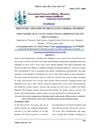 1 citations,
November 2014
1 citations,
November 2014 The document explains hair and nail biology, common hair loss conditions and treatments, oral and genital skin diseases, and the risks and treatments associated with squamous cell carcinoma.
 March 2023 in “International journal of biology, pharmacy and allied sciences”
March 2023 in “International journal of biology, pharmacy and allied sciences” The shampoo made with rice water and natural ingredients is safe and effective for improving hair health and reducing hair loss.
 34 citations,
September 1992 in “Journal of the American Academy of Dermatology”
34 citations,
September 1992 in “Journal of the American Academy of Dermatology” Dermatologists need to know about cosmetics to help patients with skin issues and recommend safe products.
 3 citations,
November 2019 in “The American Journal of Dermatopathology”
3 citations,
November 2019 in “The American Journal of Dermatopathology” Widened sweat ducts are a very specific sign of scarring hair loss.
 January 2023 in “International Journal for Research in Applied Science and Engineering Technology”
January 2023 in “International Journal for Research in Applied Science and Engineering Technology” Herbs like Tea Tree Oil and Aloe Vera could be safer, more conditioning antidandruff alternatives to synthetic products.
 23 citations,
April 2021 in “Journal of Clinical Medicine”
23 citations,
April 2021 in “Journal of Clinical Medicine” Frontal Fibrosing Alopecia's cause is unclear, affects mainly postmenopausal women, and current treatments focus on stopping hair loss rather than regrowth.
 April 2024 in “Cosmetics”
April 2024 in “Cosmetics” Different oils affect hair flexibility and strength, with their impact varying on whether hair is virgin or bleached.
 80 citations,
April 2006 in “Clinical Interventions in Aging”
80 citations,
April 2006 in “Clinical Interventions in Aging” Minoxidil and Finasteride are effective for male baldness; more research is needed for hair aging treatments.
40 citations,
January 2018 in “International journal of trichology” Healthy scalp reduces hair loss by managing oxidative stress.
5 citations,
July 2018 in “Skin appendage disorders” Sunscreen spray on the scalp may be linked to a type of scarring hair loss.
 1 citations,
September 2022 in “Journal of dermatological science”
1 citations,
September 2022 in “Journal of dermatological science” Certain vitamins and their derivatives can help hair grow longer by activating specific growth signals.
 July 2023 in “Drug testing and analysis (Print)”
July 2023 in “Drug testing and analysis (Print)” Homemade hair treatments can significantly lower drug levels in hair, possibly causing false-negative drug tests.

The serum effectively promotes hair growth and reduces gray hair without side effects.
 June 2024 in “International journal of women’s dermatology”
June 2024 in “International journal of women’s dermatology” Dermatology residents need better training to treat hair conditions in patients with skin of color.
November 2023 in “Cosmetics” Rice derivatives in conditioners protect and improve hair health.
 October 2023 in “Current Issues in Molecular Biology”
October 2023 in “Current Issues in Molecular Biology” The YH complex, made from Astragalus membranaceus and Cinnamomum cassia, may help treat hair loss by promoting hair growth and follicle development.
 January 2018 in “Elsevier eBooks”
January 2018 in “Elsevier eBooks” The document concludes that alopecia has various forms, each with specific treatments, but no definitive cure for certain types like CCCA has been proven.
37 citations,
October 2015 in “PeerJ” Perming significantly changes hair's molecular structure, while shampoo and conditioner do not.
 12 citations,
January 2020 in “Analyst”
12 citations,
January 2020 in “Analyst” Researchers found markers that can tell if hair has been bleached, which could improve hair test accuracy.
 3 citations,
May 2018 in “Journal of nutritional health & food science”
3 citations,
May 2018 in “Journal of nutritional health & food science” Nutritional supplements can help manage hair loss and promote hair growth by strengthening hair roots and countering harmful effects of pollution, smoking, and deficiencies in vitamins and minerals.
 December 2022 in “한국 미생물 생명공학회지”
December 2022 in “한국 미생물 생명공학회지” TS-SCLF from fermented Schisandra chinensis may promote hair growth and improve hair quality.
Hair Botox makes hair look healthier and fuller.
 5 citations,
April 2020 in “Jinekoloji - obstetrik ve neonatoloji tıp dergisi”
5 citations,
April 2020 in “Jinekoloji - obstetrik ve neonatoloji tıp dergisi” Some chemicals in cosmetics may harm pregnant individuals, fetuses, and newborns, and should be avoided unless necessary.
September 2022 in “Cosmetics”  1 citations,
January 2013 in “Springer eBooks”
1 citations,
January 2013 in “Springer eBooks” Cosmeceuticals may benefit skin health but need more research for efficacy and safety confirmation.
 3 citations,
August 2020 in “PubMed”
3 citations,
August 2020 in “PubMed” Some natural ingredients like onion juice, rosemary oil, and pumpkin seed oil may help with hair growth and reducing hair loss.
 1 citations,
February 2023 in “Drug Design Development and Therapy”
1 citations,
February 2023 in “Drug Design Development and Therapy” Plant adaptogens may help treat skin diseases and improve skin health, but more research is needed to fully understand how they work.
 July 2023 in “International Journal of Cosmetic Science”
July 2023 in “International Journal of Cosmetic Science” Biopolymers are increasingly used in cosmetics for their non-toxicity and skin benefits, with future biotech advancements likely to expand their applications.
3 citations,
January 2021 in “Journal of dermatology & cosmetology” Current alopecia treatments manage symptoms but don't cure, and better treatments are needed.
29 citations,
October 2020 in “Environmental health perspectives” Five preservatives may disrupt hormone function and need more health and environmental risk assessment.





















